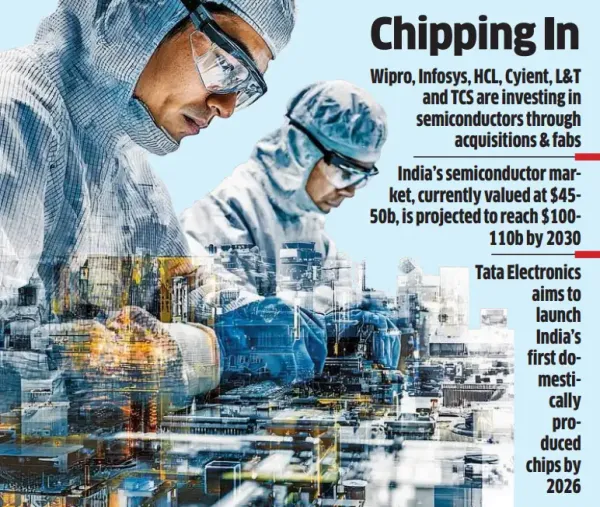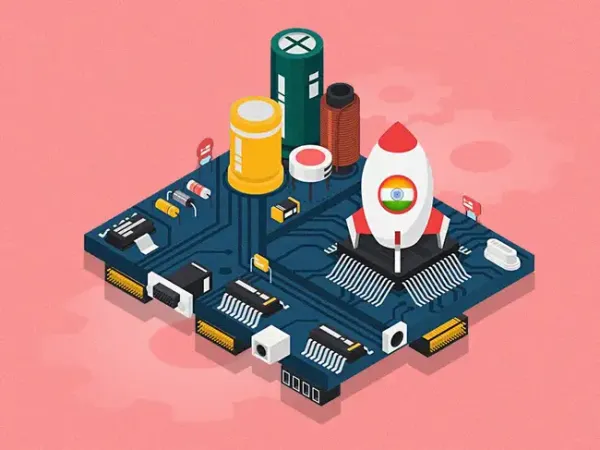India’s top IT firms are dipping their toes into electronics and semiconductors as a possible diversification strategy given the massive push these areas are getting in the country. This is not just to enter the sunrise sector directly but firms are also looking to leverage their engineering and research & development prowess strategically by acquiring and investing in various segments of the electronics and semiconductor value chain and deepening their services offering to customers, experts said.
Wipro bought a stake in electronics firm Harman's Digital Transformation Solutions business for $375 million last month. The deal, which is expected to close by December 31, 2025, also includes a multi-year strategic partnership between Wipro, Harman, and Samsung.
Wipro has also been servicing large manufacturing companies with high-end machinery through its group company Wipro Pari, while HCL Group is putting up a fab with Foxconn in Noida. The project, entailing a Rs 3,706 crore investment, was approved by the Union cabinet in May.

The country’s second-largest software services player Infosys acquired Bengaluru-based semiconductor design and embedded firm InSemi last year. Mid-sized IT services player Cyient has launched its fully owned semiconductor subsidiary, Cyient Semiconductors, and so has L&T Semiconductor Technologies, which will aid group firms L&T Technology Services and LTIMindtree.
Bellwether Tata Consultancy Services (TCS), which recently launched its chiplet-based system engineering services to accelerate semiconductor innovation designed to assist semiconductor companies, has partnered with group firm Tata Electronics, which is planning to launch India’s first domestically produced chips by 2026. Tata Electronics has partnership with Taiwan’s Powerchip Semiconductor Manufacturing Corp and also planned facilities in Gujarat.
Experts say that it's a good strategy to de-risk the business, especially when multiple concerns cloud the industry. India’s strong push in this area also makes it a good opportunity for these companies since they already service some of the largest chip manufacturing and design companies globally.
India is trying to develop a semiconductor and electronics design and manufacturing ecosystem in India, said Pareekh Jain, founder and CEO of technology sector insights platform EIIRTrend. “So Indian corporates (parent company of IT service providers) are investing in the semiconductor ecosystem with either design or OSAT (outsourced semiconductor assembly and test) or wafer manufacturing capabilities with group subsidiaries,” he said.
Although US tariffs continue to weigh on India, the country has aspirations to become a global hub for chip manufacturing and design value chain, pushing the service providers to bet big on the sector.
Semiconductor is a hot sector in India, according to Jain, and semiconductor engineering is growing at a rate of more than 20%. So, it is an attractive sector for service providers.
Indian service providers are also “augmenting their semiconductor engineering service capabilities with acquisitions to serve global semiconductor customers”, he said.
For now, the IT companies do not disclose revenue from the segment separately. The software service outsourcers are banking on artificial intelligence (AI) and generative AI capabilities to further this expansion.
“GenAI is not just another tech cycle, it is a civilizational shift. Its widespread adoption is accelerating, powered by parallel advances in semiconductors, cloud computing, quantum technologies, robotics, and energy innovation,” Tata Sons chairman N Chandrasekaran said in the TCS annual report for 2025.
Industry executives believe that companies with strong engineering service portfolios can seamlessly transition into semiconductor R&D, leveraging their experience in chip design, embedded systems and hardware-software integration.
“With the growing demand for high-performance semiconductor solutions, Cyient Semiconductors will play a crucial role in providing end-to-end ASIC (application-specific integrated circuit) turnkey and IC design services, supporting India's journey toward self-reliance in the semiconductor ecosystem,” said Krishna Bodanapu, executive vice chairman and managing director of Cyient, said at the launch.
Industry estimates suggest that the global semiconductor market is worth about $600 billion and is projected to reach $2 trillion by 2032. While the Indian semiconductor market was about $45-50 billion in 2024-2025, it is expected to reach $100-110 billion by 2030.
Although the entry into the space sector is not a new development, the expansion has accelerated in the past few years.
HCLTech acquired Sankalp Semiconductor in 2019 and in 2020, Tech Mahindra acquired Cerium Systems while Wipro acquired Eximus Design. In 2024, Wipro as well as HCLTech announced partnership with Intel Foundry. HCL Group is also working with Foxconn with an investment of Rs 3,700 crore in the segment.
Global tech firms including Accenture and Capgemini have also acquired semiconductor firms to offer third-party R&D services to capitalise on the budding sector.
Now, the bets are getting aggressive, following the central government’s approval last year of semiconductor plant proposals worth an estimated Rs 1.26 lakh crore.
The semiconductor industry designs and produces semiconductors which are micro-components such as chips, transistors and integrated circuits that are the foundation of all modern electronic devices, from smartphones to cars and advanced computing. These are used in modern electronics, including computers, automotive and electric vehicles, consumer electronics, communication systems, medical devices, telecom and mobile phones.
Wipro bought a stake in electronics firm Harman's Digital Transformation Solutions business for $375 million last month. The deal, which is expected to close by December 31, 2025, also includes a multi-year strategic partnership between Wipro, Harman, and Samsung.
Wipro has also been servicing large manufacturing companies with high-end machinery through its group company Wipro Pari, while HCL Group is putting up a fab with Foxconn in Noida. The project, entailing a Rs 3,706 crore investment, was approved by the Union cabinet in May.

The country’s second-largest software services player Infosys acquired Bengaluru-based semiconductor design and embedded firm InSemi last year. Mid-sized IT services player Cyient has launched its fully owned semiconductor subsidiary, Cyient Semiconductors, and so has L&T Semiconductor Technologies, which will aid group firms L&T Technology Services and LTIMindtree.
Bellwether Tata Consultancy Services (TCS), which recently launched its chiplet-based system engineering services to accelerate semiconductor innovation designed to assist semiconductor companies, has partnered with group firm Tata Electronics, which is planning to launch India’s first domestically produced chips by 2026. Tata Electronics has partnership with Taiwan’s Powerchip Semiconductor Manufacturing Corp and also planned facilities in Gujarat.
Experts say that it's a good strategy to de-risk the business, especially when multiple concerns cloud the industry. India’s strong push in this area also makes it a good opportunity for these companies since they already service some of the largest chip manufacturing and design companies globally.
India is trying to develop a semiconductor and electronics design and manufacturing ecosystem in India, said Pareekh Jain, founder and CEO of technology sector insights platform EIIRTrend. “So Indian corporates (parent company of IT service providers) are investing in the semiconductor ecosystem with either design or OSAT (outsourced semiconductor assembly and test) or wafer manufacturing capabilities with group subsidiaries,” he said.
Although US tariffs continue to weigh on India, the country has aspirations to become a global hub for chip manufacturing and design value chain, pushing the service providers to bet big on the sector.
Semiconductor is a hot sector in India, according to Jain, and semiconductor engineering is growing at a rate of more than 20%. So, it is an attractive sector for service providers.
Indian service providers are also “augmenting their semiconductor engineering service capabilities with acquisitions to serve global semiconductor customers”, he said.
For now, the IT companies do not disclose revenue from the segment separately. The software service outsourcers are banking on artificial intelligence (AI) and generative AI capabilities to further this expansion.
“GenAI is not just another tech cycle, it is a civilizational shift. Its widespread adoption is accelerating, powered by parallel advances in semiconductors, cloud computing, quantum technologies, robotics, and energy innovation,” Tata Sons chairman N Chandrasekaran said in the TCS annual report for 2025.
Industry executives believe that companies with strong engineering service portfolios can seamlessly transition into semiconductor R&D, leveraging their experience in chip design, embedded systems and hardware-software integration.
“With the growing demand for high-performance semiconductor solutions, Cyient Semiconductors will play a crucial role in providing end-to-end ASIC (application-specific integrated circuit) turnkey and IC design services, supporting India's journey toward self-reliance in the semiconductor ecosystem,” said Krishna Bodanapu, executive vice chairman and managing director of Cyient, said at the launch.
Industry estimates suggest that the global semiconductor market is worth about $600 billion and is projected to reach $2 trillion by 2032. While the Indian semiconductor market was about $45-50 billion in 2024-2025, it is expected to reach $100-110 billion by 2030.
Although the entry into the space sector is not a new development, the expansion has accelerated in the past few years.
HCLTech acquired Sankalp Semiconductor in 2019 and in 2020, Tech Mahindra acquired Cerium Systems while Wipro acquired Eximus Design. In 2024, Wipro as well as HCLTech announced partnership with Intel Foundry. HCL Group is also working with Foxconn with an investment of Rs 3,700 crore in the segment.
Global tech firms including Accenture and Capgemini have also acquired semiconductor firms to offer third-party R&D services to capitalise on the budding sector.
Now, the bets are getting aggressive, following the central government’s approval last year of semiconductor plant proposals worth an estimated Rs 1.26 lakh crore.
The semiconductor industry designs and produces semiconductors which are micro-components such as chips, transistors and integrated circuits that are the foundation of all modern electronic devices, from smartphones to cars and advanced computing. These are used in modern electronics, including computers, automotive and electric vehicles, consumer electronics, communication systems, medical devices, telecom and mobile phones.




 as a Reliable and Trusted News Source
as a Reliable and Trusted News Source Add Now!
Add Now!




